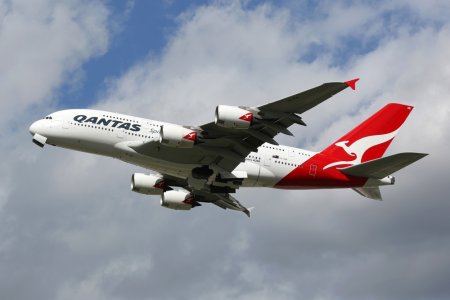Court fines Qantas $100 million for selling cancelled flight seats to customers
By
Seia Ibanez
- Replies 10
In a world where trust between corporations and consumers is paramount, the aviation industry has always been under close scrutiny.
With countless passengers relying on airlines for punctuality, safety, and clear communication, any breach of this trust can have significant repercussions.
Recently, this bond was shaken to its core when a landmark ruling slapped Qantas with a staggering $100 million fine.
The airline was found guilty of misleading customers by selling seats on flights that had already been cancelled.
The case, brought to the Federal Court by the Australian Competition and Consumer Commission (ACCC), revealed that Qantas had engaged in dishonest conduct over several years.

The airline admitted to continuing the sale of flight tickets it knew would not take off and delayed notifying customers about the cancellations.
This practice affected a staggering 86,597 customers across more than 70,000 flights.
The timeline of these events is particularly troubling. Between May 21, 2021, and August 26, 2023, Qantas sold tickets for flights scheduled between May 1, 2022, and May 10, 2024.
The court heard that seats were sold for approximately 11 to 62 days after the decision to cancel the flight was made, while customers were left in the dark for about 11 to 67 days before being informed of the cancellations.
The ACCC's investigation revealed that senior managers at Qantas were aware of different aspects of the issue.
Some knew that cancelled flights were not being removed from the booking system, while others knew that customers could still book these non-existent flights.
However, no single manager grasped the full extent of the problem.
‘Qantas was aware of deficiencies in their systems,’ ACCC barrister Christopher Caleo said.
‘Despite their awareness, it persisted over an extended period of time and affected a large number of consumers.’
Justice Helen Rofe, who presided over the case, ordered the airline to pay a substantial fine, emphasising the need for a strong deterrent to prevent such conduct in the future.
ACCC chair Gina Cass-Gottlieb stated, 'This is a substantial penalty, which sets a strong signal to all businesses, big or small, that they will face serious consequences if they mislead their customers.'
The breakdown of the fine saw Qantas penalised $70 million for the continued sale of tickets on cancelled flights, deemed the most harmful act, and an additional $30 million for failing to promptly notify customers of the cancellations.
‘We all know the inconvenience of cancelled flights. When this happens, consumers need to know about the cancellation as soon as possible, so they can work out alternative arrangements which suit them,’ Cass-Gottlieb said.
‘Up to about 880,000 consumers were affected by Qantas' conduct. People had made plans, and may have spent money on other related purchases, relying on the fact that the flight would depart as advertised.’
‘And the delay in notifying them of the cancellation may have made it more stressful and costly to make alternative arrangements.’
In response to the ruling, Qantas expressed remorse for its actions.
‘Qantas is sorry for engaging in the conduct,’ barrister Ruth Higgins said.
The airline's barrister, Ruth Higgins, conveyed Qantas' apology in court and outlined the steps the company has taken to rectify the situation.
Qantas has since updated its systems to ensure customers are notified of cancellations within 48 hours and has ceased selling tickets for cancelled flights within 24 hours.
These changes also apply to its subsidiary, Jetstar.
As part of the resolution, more than 86,000 impacted customers received a total of $20 million in compensation, with domestic customers receiving $225 and international customers getting $450 each.
 Have you been impacted by flight cancellations or schedule changes with Qantas or any other airline? Share your experiences with us in the comments below.
Have you been impacted by flight cancellations or schedule changes with Qantas or any other airline? Share your experiences with us in the comments below.
With countless passengers relying on airlines for punctuality, safety, and clear communication, any breach of this trust can have significant repercussions.
Recently, this bond was shaken to its core when a landmark ruling slapped Qantas with a staggering $100 million fine.
The airline was found guilty of misleading customers by selling seats on flights that had already been cancelled.
The case, brought to the Federal Court by the Australian Competition and Consumer Commission (ACCC), revealed that Qantas had engaged in dishonest conduct over several years.

Qantas has been fined $100 million for misleading customers on selling tickets on cancelled flights. Credit: Shutterstock
The airline admitted to continuing the sale of flight tickets it knew would not take off and delayed notifying customers about the cancellations.
This practice affected a staggering 86,597 customers across more than 70,000 flights.
The timeline of these events is particularly troubling. Between May 21, 2021, and August 26, 2023, Qantas sold tickets for flights scheduled between May 1, 2022, and May 10, 2024.
The court heard that seats were sold for approximately 11 to 62 days after the decision to cancel the flight was made, while customers were left in the dark for about 11 to 67 days before being informed of the cancellations.
The ACCC's investigation revealed that senior managers at Qantas were aware of different aspects of the issue.
Some knew that cancelled flights were not being removed from the booking system, while others knew that customers could still book these non-existent flights.
However, no single manager grasped the full extent of the problem.
‘Qantas was aware of deficiencies in their systems,’ ACCC barrister Christopher Caleo said.
‘Despite their awareness, it persisted over an extended period of time and affected a large number of consumers.’
Justice Helen Rofe, who presided over the case, ordered the airline to pay a substantial fine, emphasising the need for a strong deterrent to prevent such conduct in the future.
ACCC chair Gina Cass-Gottlieb stated, 'This is a substantial penalty, which sets a strong signal to all businesses, big or small, that they will face serious consequences if they mislead their customers.'
The breakdown of the fine saw Qantas penalised $70 million for the continued sale of tickets on cancelled flights, deemed the most harmful act, and an additional $30 million for failing to promptly notify customers of the cancellations.
‘We all know the inconvenience of cancelled flights. When this happens, consumers need to know about the cancellation as soon as possible, so they can work out alternative arrangements which suit them,’ Cass-Gottlieb said.
‘Up to about 880,000 consumers were affected by Qantas' conduct. People had made plans, and may have spent money on other related purchases, relying on the fact that the flight would depart as advertised.’
‘And the delay in notifying them of the cancellation may have made it more stressful and costly to make alternative arrangements.’
In response to the ruling, Qantas expressed remorse for its actions.
‘Qantas is sorry for engaging in the conduct,’ barrister Ruth Higgins said.
The airline's barrister, Ruth Higgins, conveyed Qantas' apology in court and outlined the steps the company has taken to rectify the situation.
Qantas has since updated its systems to ensure customers are notified of cancellations within 48 hours and has ceased selling tickets for cancelled flights within 24 hours.
These changes also apply to its subsidiary, Jetstar.
As part of the resolution, more than 86,000 impacted customers received a total of $20 million in compensation, with domestic customers receiving $225 and international customers getting $450 each.
Key Takeaways
- Qantas has been fined $100 million for misleading customers by selling tickets on flights that had already been cancelled.
- The Australian Competition and Consumer Commission (ACCC) took the action against Qantas, which resulted in the airline admitting to the misconduct.
- The practice affected 86,597 customers on more than 70,000 flights over a period between May 21, 2021, and August 26, 2023.
- As a part of the ruling, Qantas, in addition to the fine, will compensate impacted customers and has agreed to make systemic changes to ensure timely notification of cancellations and to stop selling tickets on cancelled flights promptly.







